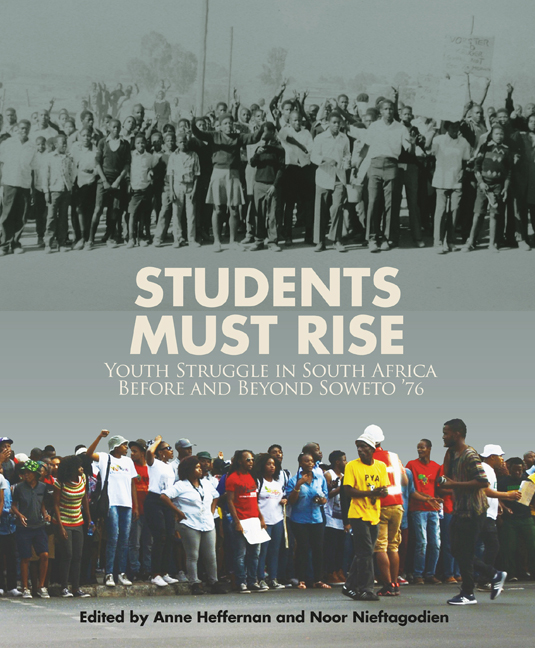Book contents
- Frontmatter
- Acknowledgements
- Contents
- Timeline
- Map Of South Africa
- Glossary
- Abbreviations
- Introduction: narratives of the student struggle
- Chapter 1 A brief history of the African Students’ Association
- Chapter 2 Youth and student culture: Riding resistance and imagining the future
- Chapter 3 The role of religion and theology in the organisation of student activists
- Chapter 4 Student organisation in Lehurutshe and the impact of Onkgopotse Abram Tiro
- Chapter 5 The University of the North: A regional and national centre of activism
- Chapter 6 Action and fire in Soweto, June 1976
- Chapter 7 What they shot in Alex
- Chapter 8 SASO and Black Consciousness, and the shift to congress politics
- Chapter 9 Youth politics and rural rebellion in Zebediela and other parts of the “homeland” of Lebowa, 1976–1977
- Chapter 10 My Journey, our journey: Activism at Ongoye University
- Chapter 11 ‘Let's begin to participate fully now in politics’: Student politics, Mhluzi township, 1970s
- Chapter 12 ‘They would remind you of 1960’: The emergence of radical student politics in the Vaal Triangle, 1972–1985
- Chapter 13 The ends of boycott
- Chapter 14 Fighting for ‘our little freedoms’: The evolution of student and youth politics in Phomolong township, Free State
- Chapter 15 ‘Every generation has its struggle’: A brief history of Equal Education, 2008–15
- Chapter 16 Contemporary student politics in South Africa: The rise of the black-led student movements of #RhodesMustFall and #FeesMustFall in 2015
- Selected Bibliography
Chapter 13 - The ends of boycott
Published online by Cambridge University Press: 21 April 2018
- Frontmatter
- Acknowledgements
- Contents
- Timeline
- Map Of South Africa
- Glossary
- Abbreviations
- Introduction: narratives of the student struggle
- Chapter 1 A brief history of the African Students’ Association
- Chapter 2 Youth and student culture: Riding resistance and imagining the future
- Chapter 3 The role of religion and theology in the organisation of student activists
- Chapter 4 Student organisation in Lehurutshe and the impact of Onkgopotse Abram Tiro
- Chapter 5 The University of the North: A regional and national centre of activism
- Chapter 6 Action and fire in Soweto, June 1976
- Chapter 7 What they shot in Alex
- Chapter 8 SASO and Black Consciousness, and the shift to congress politics
- Chapter 9 Youth politics and rural rebellion in Zebediela and other parts of the “homeland” of Lebowa, 1976–1977
- Chapter 10 My Journey, our journey: Activism at Ongoye University
- Chapter 11 ‘Let's begin to participate fully now in politics’: Student politics, Mhluzi township, 1970s
- Chapter 12 ‘They would remind you of 1960’: The emergence of radical student politics in the Vaal Triangle, 1972–1985
- Chapter 13 The ends of boycott
- Chapter 14 Fighting for ‘our little freedoms’: The evolution of student and youth politics in Phomolong township, Free State
- Chapter 15 ‘Every generation has its struggle’: A brief history of Equal Education, 2008–15
- Chapter 16 Contemporary student politics in South Africa: The rise of the black-led student movements of #RhodesMustFall and #FeesMustFall in 2015
- Selected Bibliography
Summary
In July 1985, thousands of students in the Western Cape walked out of classes in solidarity with students elsewhere, in thirty-six magisterial districts in South Africa, who were subjected to a state of emergency. Cutting across apartheid's Group Area divide, the student movement grew into a protracted educational crisis that culminated in the Trojan Horse Massacre in Athlone and a similarly staged state killing of two youths in Crossroads. The movement of students, and the many debates about indefinite boycott, states of emergency, education and liberation, and the importance of schooling were eloquently captured in a novel by Richard Rive titled Emergency Continued (Readers International 1990). Rive's novel pivots on the debate between the demands of study and revolt, especially how these demands on schooling under apartheid compelled the students of its segregated institutions to inhabit purposefully the contradiction which defined every aspiration and desire for knowledge. Implicitly, the novel asks us to consider how we name the unprecedented movement of students over a period of six months, torn between the desire for education and the effects of apartheid in blocking the desire for education. Caught in the midst of a debate of whether to argue for “liberation before education” or “education before liberation”, the name we grant to the actions of students is as important for the memory of 1985 as it is for how we are to think about the meaning of education in the present. This article asks how we might discover in the student movement of 1985 a memory that endures into the future, albeit not uncritically.
The 1986 end-of-year English examination paper developed by the apartheid state's Department of Education and Culture included a question on the origins of the word boycott. This attempt at ridicule and provocation corresponded to a protracted walkout of students in protest against apartheid education in July 1985 in the Western Cape. While many admitted to venturing a playful guess that it originated with the English cricketer, Geoffrey Boycott, I recall refusing to entertain what amounted to the dark sarcasm of faceless and nameless apartheid bureaucrats. Honestly, I did not know the answer. The Irish land agent Captain Charles C. Boycott from whom the tactic of “boycott” draws its name would equally be anathema to the students who took up the struggle against apartheid education in the 1980s.
- Type
- Chapter
- Information
- Students Must RiseYouth struggle in South Africa before and beyond Soweto ’76, pp. 148 - 156Publisher: Wits University PressPrint publication year: 2016



